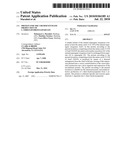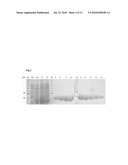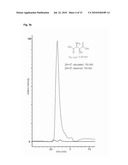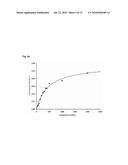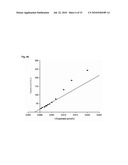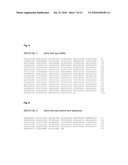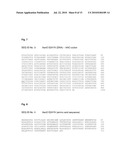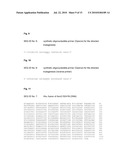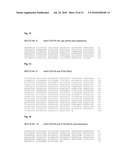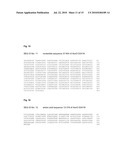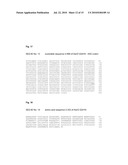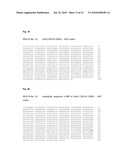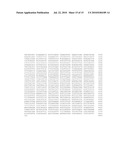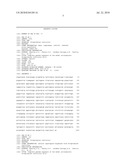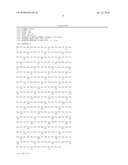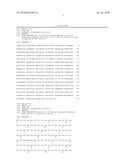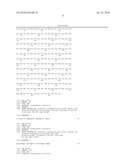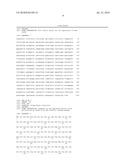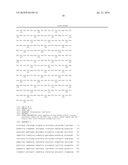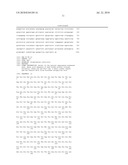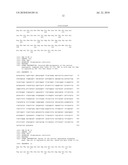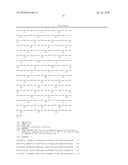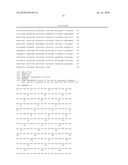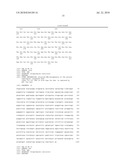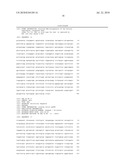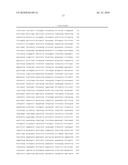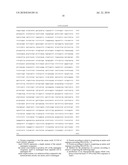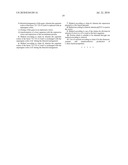Patent application title: PROTEIN FOR THE CHEMOENZYMATIC PRODUCTION OF L-THREO-HYDROXYASPARTATE
Inventors:
Mohamed A. Marahiel (Marburg, DE)
Matthias Strieker (Marburg, DE)
Lars-Oliver Essen (Marburg, DE)
IPC8 Class: AC12N978FI
USPC Class:
435227
Class name: Enzyme (e.g., ligases (6. ), etc.), proenzyme; compositions thereof; process for preparing, activating, inhibiting, separating, or purifying enzymes hydrolase (3. ) acting on carbon to nitrogen bond other than peptide bond (3.5)
Publication date: 2010-07-22
Patent application number: 20100184189
Claims:
1. Protein comprising at least the amino acids 13-318 of AsnO D241N,
whereinAsnO D241N represents a simple mutant of the natural asparagine
oxygenase,the amino acid residue at position 241 of the asparagine
oxygenase AsnO is exchanged from aspartate (D) to asparagine (N)under
simple mutant, it is understood that compared to the natural protein
exactly one amino acid is exchanged.
2. Protein according to claim 1, comprising an amino acid sequence according SEQ ID No: 12.
3. Protein according to claim 1, comprising an amino acid sequence according SEQ ID No: 14.
4. Method for the production of a protein according to claim 1, comprising the following steps:a) production of an oligonucleotide (gene) which comprises at least the bases 37-954 of the DNA sequence of AsnO,b) directed mutagenesis of this gene, wherein the aspartate codon of the bases 721-723 of AsnO is replaced with an asparagine codon,c) cloning of this gene in an expression vector,d) transformation of a host organism with the expression vector and expression of the recombinant protein.
5. Method according to claim 4, wherein the aspartate codon of the bases 721-723 of AsnO is exchanged with the asparagine codon AAC during the directed mutagenesis.
6. Method according to claim 4, wherein the aspartate codon of the bases 721-723 of AsnO is exchanged with the asparagine codon AAT during the directed mutagenesis.
7. Method according to claim 4, wherein the expression plasmid is a His fusion plasmid.
8. Method according to claim 4, wherein pQTEV is used as the vector.
9. Method according to one of the claims 4 to 8 claim 4, wherein Eschericia coli is used as the host organism.
10. Protein which is suitable to be obtained through one method according to claim 4.
11. Use of a protein according to claim 1 for the chemoenzymatic and enantioselective production of L-threo-hydroxyaspartate.
Description:
[0001]The invention at hand describes a mutated iron-(II)- and
α-ketoglutarate-dependent hydroxylase. The protein according to the
present invention is a mutant of the natural asparagine oxygenase AsnO
(wild type), wherein the amino acid 241 of the wild type (aspartate) is
exchanged with asparagine. The obtained mutant (AsnO D241N) is capable of
catalyzing the quantitative synthesis of L-(-)threo-3-hydroxyaspartate
from L-aspartate.
DESCRIPTION AND INTRODUCTION TO THE GENERAL AREA OF THE INVENTION
[0002]The invention at hand concerns the areas of protein biochemistry, molecular biology and chemoenzymatic synthesis.
STATE OF THE ART
[0003]L-glutamate plays a major role in the mammalian central nervous system (CNS), acting as a primary excitatory neurotransmitter. Hereby, L-glutamate takes part in a wide range of neuronal communications, whereby a large amount of excitatory amino acid receptors is activated which are responsible for complex signal transmissions, such as memory formation, learning processes and development, as well as the immune response to injuries. L-glutamate, however, can also over-activate these receptors and thereby also contribute to an acute or chronic damage in the CNS.
[0004]Hence, a regulation of the amount of the excitatory L-glutamate is decisive, as a lack of L-glutamate leads to a reduced signal transmission, whereas an excess causes the initiation of excitotoxic signal pathways. An excess of L-glutamate occurs, for instance, in anemia, hypoglycaemia, Huntington's disease, Alzheimer's disease, amyotrophic lateral sclerosis, tardive dyskinesias, anxiety disorders, clinical depressions, schizophrenia, epilepsy, astrocytomas and some liver diseases.
[0005]The major part of the glutamate transport in the CNS is mediated by high-affinity and sodium-dependent EAA transporters ("excitatory amino acid transporter").
[0006]It was shown that the EAA analog L-threo-hydroxaspartate inhibits the function of the glutamate transporters (R J Bridges, M P Kavanaugh, A R Chamberlin: A pharmacological review of competitive inhibitors and substrates of high-affinity, sodium-dependent glutamate transport in the central nervous system. Curr Pharm Des 1999, 5, 363-379). The benzylated derivative (L-TBOA) also comprises this inhibitor effect (K Shimamoto, B Lebrun, Y Yasuda-Kamatani, M Sakaitani, Y Shigeri, N Yumoto, T Nakajima: DL-threo-beta-benzyloxyaspartate, a potent blocker of excitatory amino acid transporters. Mol Pharmacol 1998, 53, 195-201 and K Shimamoto, Y Shigeri, Y Yasuda-Kamatani, B Lebrun, N Yumoto, T Nakajima: Syntheses of optically pure beta-hydroxyaspartate derivatives as glutamate transporter blockers. Bioorg Med Chem Lett 2000, 10, 2407-2410).
[0007]The synthesis of a racemic mixture of DL-threo-hydroxyaspartate and its erythreo form was described for the first time in 1921 by Dakin. This synthesis route starts with fumarate or malate as starting material. The unsaturated acid is converted to chloromalate and subsequently aminated to hydroxyaspartate (HD Dakin: The synthesis of inactive para- and anti-hydroxyaspartic acids (aminomalic acids). J Biol Chem 1921, 48, 273-291).
[0008]The second known synthesis route is described in detail for β-methyl-β-hydroxyaspartate and comprises a condensation of the aldol type between copper glycinate and a carbonyl compound (L Benoiton, S M Birnbaum, M Winitz, J P Greenstein: The enzymatic route of beta-methylaspartic acid with acylase II. Arch Biochem Biophys 1959, 81, 434-438). This synthesis route, however, leads to a complex diastereomeric mixture.
[0009]The synthesis of optically pure L-TBOA, the most efficient inhibitor of the glutamate transporters, starts with (R)-Garner-aldehyde, comprises seven synthesis steps and is time- and cost-intensive (K Shimamoto, Y Shigeri, Y Yasuda-Kamatani, B Lebrun, N Yumoto, T Nakajima: Syntheses of optically pure beta-hydroxyaspartate derivatives as glutamate transporter blockers. Bioorg Med Chem Lett 2000, 10, 2407-2410).
[0010]Methods for the production of L-threo-hydroxyaspartate known to date are time-consuming, cost-intensive and do not yield an enantiomerically pure product. A method for the enantioselective synthesis of L-threo-hydroxyaspartate (L-THA) would be, however, desirable, as L-TBOA can easily be produced from L-THA. The invention at hand provides a novel protein which enables the chemoenzymatic and enantiomerically pure production of L-threo-hydroxyaspartate from L-aspartate.
AIM
[0011]The aim of the invention at hand is to provide a protein which catalyzes the chemoenzymatic and enantioselective synthesis of L-threo-hydroxyaspartate from L-aspartate.
ACHIEVEMENT OF THIS AIM
[0012]This aim is achieved according to the present invention through a protein comprising at least the amino acids 13-318 of AsnO D241N, wherein [0013]AsnO D241N represents a simple mutant of the natural asparagine oxygenase, [0014]the amino acid residue at position 241 of the asparagine oxygenase AsnO is exchanged from aspartate (D) to asparagine (N) [0015]under simple mutant, it is understood that compared to the natural protein exactly one amino acid is exchanged.
[0016]The natural protein AsnO (asparagine oxygenase) is part of the CDA biosynthesis gene cluster in Streptomyces coelicor, wherein CDA means "calcium-dependent antibiotic". AsnO is a Fe2+ and α-ketoglutarate-dependent hydroxylase which exclusively catalyzes the production of L-threo-hydroxyaspartate from L-asparagine. L-threo-hydroxyaspartate acts in vivo as a building block for non-ribosomally produced CDA. During the catalytic cycle, this class of enzymes couples the oxidative decomposition of α-ketoglutarate to succinate and CO2 with the hydroxylation of the substrate (L-asparagine).
[0017]In the wild type of AsnO, thereby the side chain of the amino acid residue Asp-241 binds to the NH2 group of the carboxamide group of L-Asn.
[0018]Surprisingly, it has been found that a directed mutagenesis of Asp-241 to Asn-241 (D241N) results in a binding site for the carboxyl group of an aspartate side chain. By means of this directed mutagenesis, the substrate specificity changes from asparagine to aspartate, and the mutated protein converts aspartate chemoenzymatically to L-threo-hydroxyaspartate in the presence of Fe2+ and α-ketoglutarate (α-KG). The reaction occurs in a quantitative and enantioselective manner according to the following scheme:
##STR00001##
[0019]The protein mutated in this way, is hereinafter called AsnO D241N. According to the present invention, AsnO D241N is called "simple mutant" of the wild type AsnO. Hereby, "simple mutant" means that in AsnO D241N exactly one amino acid (here: amino acid 241) is modified as compared to the wild type.
[0020]Surprisingly, it has been found that a protein which comprises at least the amino acid sequence of the AsnO D241N from the first to the last secondary structure element converts L-aspartate into the corresponding L-threo-hydroxyaspartate. Hereby, "from the first to the last secondary structure element" means that at least the sequence of amino acid D13 (aspartate) to M318 (methionine) of AsnO D241N has to be present.
[0021]In a particularly preferred embodiment the protein, which catalyzes the conversion from L-Asp to L-threo-hydroxyaspartate, comprises the amino acids A2 (alanine) to A333 (alanine) of AsnO D241N.
[0022]According to the present invention, a protein comprising at least the amino acids 13-318 of AsnO D241N is produced carrying out, firstly, a directed mutagenesis of the gene of the AsnO wild type; subsequently the cloning of this gene into a vector occurs and finally a host organism is transformed with the expression vector and the recombinant protein is expressed.
[0023]According to the present invention, during the directed mutagenesis the codon GAC (bases 721-723), which codes in the wild type for Asp-241, is replaced by a codon which codes for Asn. It is known to persons skilled in the art that the codons AAC and AAT code for asparagine. According to the present invention, the directed mutagenesis can consist of the replacement of GAC with AAC or of GAC with AAT.
[0024]In a preferred embodiment, GAC is replaced with AAC during the directed mutagenesis. It is known to persons skilled in the art that the directed mutagenesis can be carried out through the selection of suitable oligonucleotide primers with corresponding sites of mutagenesis. He is able to apply this knowledge without leaving the scope of protection of the patent claims.
[0025]Analogously to the definition of the term "simple mutant" on protein level, "simple mutant" on nucleic acid level means that exactly one codon (here: bases 721-723) is modified as compared to the wild type.
[0026]It is known to persons skilled in the art how to clone oligonucleotides into vectors. A suitable vector is, for instance, pQTEV.
[0027]Bacterial strains, for instance Eschericia coli, are known to the person skilled in the art to be suitable as host organism, which can be transformed with the expression vector and can then express the recombinant protein.
[0028]The protein according to the present invention, comprising at least the amino acids 13-318 of AsnO D241N, is produced by a method comprising the following steps: [0029]a) production of a oligonucleotide (gene) which comprises at least the bases 37-954 of the DNA sequence of AsnO, [0030]b) directed mutagenesis of this gene, wherein the aspartate codon of the bases 721-723 of AsnO is replaced with an asparagine codon, [0031]c) cloning of this gene in an expression vector, [0032]d) transformation of a host organism with the expression vector and expression of the recombinant protein.
[0033]In a preferred embodiment, the expression plasmid is produced in the form of a His fusion plasmid, which leads to the expression of a protein according to the present invention with an N-terminal His tag. Hereby, tags with 5 to 8 histidine residues following one another are preferred. It is known to persons skilled in the art that it is advantageous to purify such His tag fusion proteins by means of affinity chromatography using a Ni-chelate column.
[0034]The protein according to the present invention is suitable for being used for the production of L-threo-hydroxyaspartate. For that purpose, L-aspartate is incubated in the presence of the protein according to the present invention and the cofactor Fe2+-- as well as the cosubstrate α-ketoglutarate. Hereby, a non-activated β-methylene group (here: the β-CH2 group of aspartate) is hydroxylated enzymatically. This enzymatic hydroxylation is particularly advantageous, as it is generally difficult to access the non-activated β-CH2 groups using classical chemical ways. Furthermore, "purely chemical", not enzymatically, catalyzed reactions of β-CH2 groups of amino acids generally yield enantiomeric or diastereomeric mixtures. The chemoenzymatic production of L-threo-hydroxyaspartate with the help of the protein according to the present invention occurs, however, in an enantioselective and substrate-specific manner, as AsnO D241N hydroxylates exclusively L-aspartate and exclusively L-threo-hydroxyaspartate is produced.
EMBODIMENTS
Practical Embodiment 1
Production of the Expression Plasmid and Directed Mutagenesis
[0035]A directed mutagenesis of the AsnO wild type is carried out, wherein the codon for Asp-241 of the wild type is modified to Asn-241. The used AsnO is part of the CDA biosynthesis gene cluster in Streptomyces coelicor, wherein CDA means "calcium-dependent antibiotic". SEQ ID No: 1 shows the DNA sequence of the AsnO wild type.
[0036]The recombinant gene fragments are amplified by means of polymerase chain reaction from chromosomal DNA of Streptomyces coelicolor A3(2) (DSM 40783) using the Phusion Polymerase (Finnzymes). According to the manufacturer's instructions for template DNA with high GC concentration (S. coelicolor, 74%) the dNTP concentration is increased to 20 mM.
[0037]For the execution of the directed mutagenesis the QuickChange II Site-directed Mutagenesis Kit (Stratagene) is used according to manufacturer's instructions. The synthetic oligonucleotide primers (Operon)
TABLE-US-00001 (SEQ ID No: 5) 5'-CCCCGACCTGCGGGTGAACCTGGCGGCCACCGAGC-3' and (SEQ ID No: 6) 5'-GCTCGGTGGCCGCCAGGTTCAC CCGCAGGTCGGGG-3'
are used; the site of mutagenesis is underlined.
[0038]The identity of the mutated plasmid produced in this way is confirmed by means of DNA dideoxy sequencing.
[0039]SEQ ID No: 3 shows the DNA sequence of AsnO D241N; SEQ ID No: 11 shows the DNA sequence of the corresponding His7 fusion (1.074 kb).
Practical Embodiment 2
Production of the Recombinant Enzyme
[0040]The mutated AsnO gene is cloned into the Bam HI sites and Not I sites of the pQTEV vector (SEQ ID No: 17, GenBank accession number AY--243506). This pQE30-based (Qiagen) cloning product is used for the transformation of E. coli BL21 (DE3) (Novagen). The transformed cells are cultivated at 37° C. up to an optical density of 0.5 (λ=600 nm), induced with 1 mM isopropyl-β-D-thiogalactopyranoside and harvested at 30° C. after further 3 h. The recombinant proteins are purified by means of Ni-NTA affinity chromatography (Amersham Pharmacia Biotech). A 12% SDS-PAGE gel to control the purification is shown in FIG. 2.
[0041]The lanes with purified protein are cut from the gel, combined and subjected to buffer exchange in 25 mM HEPES, 50 mM NaCl, pH 7.0, using Hi-Trap desalting columns (Amersham Pharmacia Biotech). The concentration of the purified protein is determined spectrophotometrically at 280 nm using calculated extinction coefficients. After flash freezing in liquid nitrogen, the purified protein is stored until further use at -80° C.
[0042]SEQ ID No: 2 shows the amino acid sequence of the AsnO wild type.
[0043]SEQ ID No: 12 shows the amino acid sequence of the AsnO D241N His7 tag;
[0044]SEQ ID No: 10 shows the amino acid sequence of AsnO D241N without cloning artifacts: these are the His7 tag, a short linker region and the "tobacco etch virus protease" recognition site. The amino acid 1 of the AsnO wild type is methionine. Using the pQTEV vector the methionine codon of the AsnO wild type is converted into a serine codon in such a way that in SEQ ID No: 8 and SEQ ID No: 10 the first amino acid of the AsnO D241N is serine and not methionine.
Practical Embodiment 3
Activity of the AsnO D241N Mutant
[0045]In order to evaluate the activity of the AsnO D241N mutant, the purified enzyme
[0046]AsnO D241N (40 μM) is incubated with 1.5 mM L-Asp, 1.0 mM (NH4)2Fe(SO4)2 as source for the iron cofactor and 1.0 mM α-ketoglutarate (cosubstrate) at different temperatures between 16° C. and 37° C. during 16 h. The reaction is monitored by means of HPLC MS, by scanning the masses for L-Asp ([M+H].sup.+=134.5 Da) and its hydroxylated form ([M+H].sup.+=150.04 Da). The incubation of L-aspartate with AsnO D241N leads to the quantitative conversion thereof to L-threo-3-hydroxyaspartate at 16° C. (FIG. 3a). In the control reaction, in which no enzyme is added, only L-Asp can be detected (FIG. 3b). Commercially available L-Asp (Bachem) as well as L-threo-3-hydroxyaspartate (Tocris Bioscience) are used as standards for the comparison of the retention times with HPLC.
Practical Embodiment 4
Evaluation of the Kinetic Parameters
[0047]For the evaluation of the kinetic parameters at different concentrations of the substrate L-Asp (50 μM to 2 mM), the latter was incubated as described under practical embodiment 3 with AsnO D241N (40 μM), 1.0 mM (NH4)2Fe(SO4)2 as source of the iron cofactor and 1.0 mM α-ketoglutarate (cosubstrate) and the enzyme assay was stopped at different points in time by adding nonafluoropentane acid. Furthermore, nonaflluoropentane acid functions as ion pairing reagent in the case of HPLC analysis.
[0048]The graphic plot of the initial speeds against the substrate concentrations shows that it is a Michaelis-Menten kinetics (FIG. 4a).
[0049]The kinetic parameters of AsnO D241N are subsequently determined by means of a Lineweaver-Burk equation (FIG. 4b).
[0050]AsnO D241N results in KM=0.457±0.031 mM with kcat=1.0±0.1 min-1 for L-Asp. The catalytic efficiency is kcat/Km=2.2±0.4 min-1*mM-1. In comparison to that, the wild type AsnO comprises an almost identical Km value of 0.478±0.067 mM for L-Asn, but possesses a 300 times higher kcat (298±19 min-1).
TABLE-US-00002 TABLE 1 substrate specificity of AsnO D241N [M + H].sup.+ [M + H].sup.+ hydroxylation [M + H]+ Amino acid calculated product found hydroxylation L-Asp 134.0 150.0 150.0 yes D-Asp 134.0 150.0 134.1 no L-Asn 133.1 149.1 133.0 no L-Gln 147.1 163.1 147.2 no L-Glu 148.1 164.1 148.2 no L-Ile 132.1 148.1 132.2 no L-Phe 166.1 182.1 166.1 no L-Trp 205.1 221.1 205.1 no L-Val 118.1 134.1 118.0 no
Practical Embodiment 5
Substrate Specificity of the Mutated Protein AsnO D241N
[0051]The specificity of AsnO D241N for the conversion of L-Asp in L-threo-3-hydroxyaspartate is examined by incubating this mutated protein during 16 h at 16° C. with the amino acids (1.5 mM) listed in Table 1, the cofactor (NH4)2Fe(SO4)2 (1 mM), the cosubstrate α-ketoglutarate (4 mM) and 20 μg catalase in 250 to 1 mL of a 50 mM HEPES buffer (pH 7.5). The catalase is added in order to quench reactive oxygen species and to prevent hereby the autoxidation of the enzyme. Controls are carried out in the absence of AsnO D241N.
[0052]The reaction is stopped by the addition of 50-200 μL of a 4% solution (V/V) of nonafluoropentane acid and subsequently the hydroxylation of the amino acid substrate to the respectively corresponding hydroxy amino acid is examined by means of reversed phase HPLC/MS. Column: Hypercarb (Thermo Electron Corporation, pore diameters of 250 Å, particle size of 5 μM, 100% carbon). Mobile phases: A=20 mM aqueous nonafluoropentane acid, B=acetonitrile. Gradient: 0-10% B in 12 min, flow rate 0.2 mL/min at 17.5° C.
[0053]The reaction product of the incubation of the respective amino acid with AsnO D241N is carried out by means of highest resolution MS with an API Qstar Pulsar I (Applied Biosystems).
FIGURE LEGENDS
[0054]FIG. 1 Crystal structure of AsnO with bound L-threo-J3-hydroxyasparagine and succinate (PDB accession code: 2OG7). The mutant Asp-241 to Asn-241 stabilizes Asp within the binding site and changes hereby the substrate specificity from L-Asn to L-Asp.
[0055]FIG. 2 FIG. 2 shows a 12% SDS-PAGE of the purification of AsnO D241N by means of [0056]Ni-NTA affinity chromatography. [0057]M protein marker (Fermentas, PageRuler) [0058]B.I. before induction [0059]A.I. after induction [0060]T1 first flow-through fraction of the raw lysate [0061]T2 last flow-through fraction of the raw lysate [0062]Lanes 5-13: elution fractions of the Ni-NTA affinity chromatography elution occurs by competitive replacement of the His7 tag by an imidazole solution (250 mM, buffered with 50 mM HEPES and 100 mM NaCl, pH=7.5).
[0063]FIG. 3 Quantitative conversion of L-Asp in L-threo-3-hydroxyaspartate; determination by means of HPLC-MS
Column: Hypercarb (Thermo Electron Corporation, pore diameters of 250 Å, particle size of 5 μM, 100% carbon). Mobile phases: A=20 mM aqueous nonafluoropentane acid, B=acetonitrile Gradient: 0-10% B in 12 min, flow rate 0.2 mL 1 min at 17.5° C. [0064]FIG. 3a: negative control, no addition of enzyme (=AsnO D241N) [0065]Only L-Asp is detected. [0066]Retention time: 3.72 min; [0067]Mber=134.045, Mgef=134.048 [0068]FIG. 3b: incubation of L-Asp with AsnO D241N [0069]After 16 h of incubation at 16° C. only [0070]L-threo-3-hydroxyaspartate is detected. [0071]Retention time 3.39 min; [0072]Mber=150.040, Mgef=150.042
[0073]The detection occurs by means of high resolution MS.
[0074]FIG. 4 4a: Michaelis-Menten diagram for the conversion of L-Asp in L-threo-3-hydroxyaspartate through AsnO D241N
4b: Lineweaver-Burke diagram for the conversion of L-Asp into L-threo-3-hydroxyaspartate through AsnO D241N
[0075]FIG. 5 SEQ ID No: 1 AsnO wild type (DNA)
GenBank accession number of the AsnO wild type (DNA): NC--003888Gen: complement (3587687 . . . 3588688)
Locus_tag="5003236"
[0076]synonym: "SCE29.05c"
[0077]FIG. 6 SEQ ID No: 2 AsnO wild type (amino acid sequence)
GenBank accession number of the AsnO wild type (protein): NP--627448
[0078]FIG. 7 SEQ ID No: 3 AsnO D241N (DNA)-AAC-codon
bases 721-723: AAC instead of GAC in the wild type of the AsnO
[0079]FIG. 8 SEQ ID No: 4 AsnO D241N (amino acid sequence)
Mutant of the natural asparagine oxygenase AsnO; Asp-241 has been replaced by Asn-241
[0080]FIG. 9 SEQ ID No: 5 synthetic oligonucleotide primer (Operon) for the directed mutagenesis of the AsnO wild type [0081]Exchange of the GAC (wild type) for AAC (AsnO D241N)
[0082]FIG. 10 SEQ ID No: 6 synthetic oligonucleotide primer (Operon) for the directed mutagenesis of the AsnO wild type (reverse primer) [0083]Reverse primer: exchange of GTC (wild type) for GTT (AsnO D241N)
[0084]FIG. 11 SEQ ID No: 7 His7 fusion of AsnO D241N (DNA) [0085](His, fusion insert for the expression of AsnO D241N)
[0086]FIG. 12 SEQ ID No: 8 AsnO D241N His7 tag (amino acid sequence) [0087]Sequence of the expressed protein after purification by means of Ni-NTA affinity chromatography
[0088]FIG. 13 SEQ ID No: 9 AsnO D241N and M1S (DNA)
Base sequence of AsnO D241N without cloning artifacts; these are the His7 tag, a short linker region and the "Tobacco Etch Virus Protease" recognition site.
[0089]FIG. 14 SEQ ID No: 10 AsnO D241N and M1S (amino acid sequence)
Amino acid sequence of AsnO D241N without cloning artifacts; these are the His7 tag, a short linker region and the "tobacco etch virus protease" recognition site.
[0090]FIG. 15 SEQ ID No: 11 nucleotide sequence 37-954 of AsnO D241N
[0091]FIG. 16 SEQ ID No: 12 amino acid sequence 13-318 of AsnO D241N
[0092]FIG. 17 SEQ ID No: 13 nucleotide sequence 4-999 of AsnO D241N
[0093]FIG. 18 SEQ ID No: 14 amino acid sequence 2-333 of AsnO D241N
[0094]FIG. 19 SEQ ID No: 15 AsnO D241N (DNA)-AAT-codon
Bases 721-723: AAT instead of GAC in the wild type of the AsnO
[0095]FIG. 20 SEQ ID No: 16 nucleotide sequence 4-999 of AsnO D241N-AAT-codon
[0096]FIG. 21 SEQ ID No: 17 nucleotide sequence of the cloning vector pQTEV
GenBank accession number: AY 243506
Sequence CWU
1
1711002DNAStreptomyces coelicolorGene complement (3587687..3588688)
Locus_tag=SCO3236 Synonym SCE29.05c 1atggctgcga atgccgcggg
accggcgtcg cgctacgacg tgacgctgga tcagtcggat 60gcggaactcg tcgaggagat
cgcctggaaa ctcgccacgc aggcgaccgg gcggcccgac 120gacgccgaat gggtcgaggc
ggccaggaac gcctggcacg cctggccggc gaccctgcgc 180cgggacctcg ccggattccg
ccgggactcg ggaccggacg gcgcgatcgt gctgcgcggt 240ctgcccgtcg actccatggg
gctgccgccg accccgcggg tcaacggctc cgtgcagcgc 300gaggcctcgc tgggcgccgc
cgtgctgctg atgaccgcct gcgggctcgg cgaccccggc 360gcgttcctgc cggagaagaa
cggcgccctc gtacaggacg tcgtccccgt gccgggcatg 420gaggagttcc agggcaacgc
cggttcgacc ctgctgacgt tccacaacga gaacgccttc 480cacgagcacc gccccgactt
cgtgatgctg ctgtgcctgc gcgccgaccc cacgggccgg 540gcgggcctgc gcaccgcgtg
cgtgcggcgg gtgctgccgc tgctgtccga ctccaccgtg 600gacgccctgt gggcaccgga
gttccgcacc gcgccgccgc cctccttcca gctgagcggc 660cccgaggagg cacccgcacc
ggtactcctc ggcgaccgtt cggaccccga cctgcgggtg 720gacctggcgg ccaccgagcc
ggtgaccgag cgggccgccg aggccctgcg cgaactccag 780gcccacttcg acgccaccgc
cgtcacccac cgcctcctgc ccggggagct ggcgatcgtg 840gacaaccgcg tcaccgtgca
cggccgcacc gagttcaccc cccgctacga cggcaccgac 900cgctggctcc agcgcacctt
cgtgctcacc gacctgcgcc gctcgcgcgc gatgcggccg 960gccgacggct acgtgctcgg
agcggccccg cagcccgcct ga 10022333PRTStreptomyces
coelicolornatural asparagine-oxygenase from Streptomyces coelicolor
2Met Ala Ala Asn Ala Ala Gly Pro Ala Ser Arg Tyr Asp Val Thr Leu1
5 10 15Asp Gln Ser Asp Ala Glu
Leu Val Glu Glu Ile Ala Trp Lys Leu Ala 20 25
30Thr Gln Ala Thr Gly Arg Pro Asp Asp Ala Glu Trp Val
Glu Ala Ala 35 40 45Arg Asn Ala
Trp His Ala Trp Pro Ala Thr Leu Arg Arg Asp Leu Ala 50
55 60Gly Phe Arg Arg Asp Ser Gly Pro Asp Gly Ala Ile
Val Leu Arg Gly65 70 75
80Leu Pro Val Asp Ser Met Gly Leu Pro Pro Thr Pro Arg Val Asn Gly
85 90 95Ser Val Gln Arg Glu Ala
Ser Leu Gly Ala Ala Val Leu Leu Met Thr 100
105 110Ala Cys Gly Leu Gly Asp Pro Gly Ala Phe Leu Pro
Glu Lys Asn Gly 115 120 125Ala Leu
Val Gln Asp Val Val Pro Val Pro Gly Met Glu Glu Phe Gln 130
135 140Gly Asn Ala Gly Ser Thr Leu Leu Thr Phe His
Asn Glu Asn Ala Phe145 150 155
160His Glu His Arg Pro Asp Phe Val Met Leu Leu Cys Leu Arg Ala Asp
165 170 175Pro Thr Gly Arg
Ala Gly Leu Arg Thr Ala Cys Val Arg Arg Val Leu 180
185 190Pro Leu Leu Ser Asp Ser Thr Val Asp Ala Leu
Trp Ala Pro Glu Phe 195 200 205Arg
Thr Ala Pro Pro Pro Ser Phe Gln Leu Ser Gly Pro Glu Glu Ala 210
215 220Pro Ala Pro Val Leu Leu Gly Asp Arg Ser
Asp Pro Asp Leu Arg Val225 230 235
240Asp Leu Ala Ala Thr Glu Pro Val Thr Glu Arg Ala Ala Glu Ala
Leu 245 250 255Arg Glu Leu
Gln Ala His Phe Asp Ala Thr Ala Val Thr His Arg Leu 260
265 270Leu Pro Gly Glu Leu Ala Ile Val Asp Asn
Arg Val Thr Val His Gly 275 280
285Arg Thr Glu Phe Thr Pro Arg Tyr Asp Gly Thr Asp Arg Trp Leu Gln 290
295 300Arg Thr Phe Val Leu Thr Asp Leu
Arg Arg Ser Arg Ala Met Arg Pro305 310
315 320Ala Asp Gly Tyr Val Leu Gly Ala Ala Pro Gln Pro
Ala 325 33031002DNAStreptomyces
coelicolorsite-directed DNA-mutagenesis of natural asparagine
oxygenase AsnO Codon 721-723 (GAC in wildtype for Asp) is replaced
by AAC (for Asn) 3atggctgcga atgccgcggg accggcgtcg cgctacgacg tgacgctgga
tcagtcggat 60gcggaactcg tcgaggagat cgcctggaaa ctcgccacgc aggcgaccgg
gcggcccgac 120gacgccgaat gggtcgaggc ggccaggaac gcctggcacg cctggccggc
gaccctgcgc 180cgggacctcg ccggattccg ccgggactcg ggaccggacg gcgcgatcgt
gctgcgcggt 240ctgcccgtcg actccatggg gctgccgccg accccgcggg tcaacggctc
cgtgcagcgc 300gaggcctcgc tgggcgccgc cgtgctgctg atgaccgcct gcgggctcgg
cgaccccggc 360gcgttcctgc cggagaagaa cggcgccctc gtacaggacg tcgtccccgt
gccgggcatg 420gaggagttcc agggcaacgc cggttcgacc ctgctgacgt tccacaacga
gaacgccttc 480cacgagcacc gccccgactt cgtgatgctg ctgtgcctgc gcgccgaccc
cacgggccgg 540gcgggcctgc gcaccgcgtg cgtgcggcgg gtgctgccgc tgctgtccga
ctccaccgtg 600gacgccctgt gggcaccgga gttccgcacc gcgccgccgc cctccttcca
gctgagcggc 660cccgaggagg cacccgcacc ggtactcctc ggcgaccgtt cggaccccga
cctgcgggtg 720aacctggcgg ccaccgagcc ggtgaccgag cgggccgccg aggccctgcg
cgaactccag 780gcccacttcg acgccaccgc cgtcacccac cgcctcctgc ccggggagct
ggcgatcgtg 840gacaaccgcg tcaccgtgca cggccgcacc gagttcaccc cccgctacga
cggcaccgac 900cgctggctcc agcgcacctt cgtgctcacc gacctgcgcc gctcgcgcgc
gatgcggccg 960gccgacggct acgtgctcgg agcggccccg cagcccgcct ga
10024333PRTStreptomyces coelicolormutant of the natural
asparagine oxygenase AsnO; Asn-241 is replaced by Asp-241 4Met Ala
Ala Asn Ala Ala Gly Pro Ala Ser Arg Tyr Asp Val Thr Leu1 5
10 15Asp Gln Ser Asp Ala Glu Leu Val
Glu Glu Ile Ala Trp Lys Leu Ala 20 25
30Thr Gln Ala Thr Gly Arg Pro Asp Asp Ala Glu Trp Val Glu Ala
Ala 35 40 45Arg Asn Ala Trp His
Ala Trp Pro Ala Thr Leu Arg Arg Asp Leu Ala 50 55
60Gly Phe Arg Arg Asp Ser Gly Pro Asp Gly Ala Ile Val Leu
Arg Gly65 70 75 80Leu
Pro Val Asp Ser Met Gly Leu Pro Pro Thr Pro Arg Val Asn Gly
85 90 95Ser Val Gln Arg Glu Ala Ser
Leu Gly Ala Ala Val Leu Leu Met Thr 100 105
110Ala Cys Gly Leu Gly Asp Pro Gly Ala Phe Leu Pro Glu Lys
Asn Gly 115 120 125Ala Leu Val Gln
Asp Val Val Pro Val Pro Gly Met Glu Glu Phe Gln 130
135 140Gly Asn Ala Gly Ser Thr Leu Leu Thr Phe His Asn
Glu Asn Ala Phe145 150 155
160His Glu His Arg Pro Asp Phe Val Met Leu Leu Cys Leu Arg Ala Asp
165 170 175Pro Thr Gly Arg Ala
Gly Leu Arg Thr Ala Cys Val Arg Arg Val Leu 180
185 190Pro Leu Leu Ser Asp Ser Thr Val Asp Ala Leu Trp
Ala Pro Glu Phe 195 200 205Arg Thr
Ala Pro Pro Pro Ser Phe Gln Leu Ser Gly Pro Glu Glu Ala 210
215 220Pro Ala Pro Val Leu Leu Gly Asp Arg Ser Asp
Pro Asp Leu Arg Val225 230 235
240Asn Leu Ala Ala Thr Glu Pro Val Thr Glu Arg Ala Ala Glu Ala Leu
245 250 255Arg Glu Leu Gln
Ala His Phe Asp Ala Thr Ala Val Thr His Arg Leu 260
265 270Leu Pro Gly Glu Leu Ala Ile Val Asp Asn Arg
Val Thr Val His Gly 275 280 285Arg
Thr Glu Phe Thr Pro Arg Tyr Asp Gly Thr Asp Arg Trp Leu Gln 290
295 300Arg Thr Phe Val Leu Thr Asp Leu Arg Arg
Ser Arg Ala Met Arg Pro305 310 315
320Ala Asp Gly Tyr Val Leu Gly Ala Ala Pro Gln Pro Ala
325 330535DNAStreptomyces coelicolorsynthetic
oligonucleotide primer (Operon) for directed mutagenesis of the AsnO
wild type. Exchange of the GAC (wild type) for AAC (AsnO D241N).
5ccccgacctg cgggtgaacc tggcggccac cgagc
35635DNAStreptomyces coelicolorsynthetic oligonucleotide primer (Operon)
for directed mutagenesis of the AsnO-wild type. reverser primer
exchange of the GTC (wild type) for GTT (AsnO D241N) 6gctcggtggc
cgccaggttc acccgcaggt cgggg
3571074DNAStreptomyces coelicolorHis7 fusion insert for the expression of
AsnO D241N 7atgaaacatc accatcacca tcaccatagc gattacgaca tccccactac
tgagaatctt 60tattttcagg gatccgctgc gaatgccgcg ggaccggcgt cgcgctacga
cgtgacgctg 120gatcagtcgg atgcggaact cgtcgaggag atcgcctgga aactcgccac
gcaggcgacc 180gggcggcccg acgacgccga atgggtcgag gcggccagga acgcctggca
cgcctggccg 240gcgaccctgc gccgggacct cgccggattc cgccgggact cgggaccgga
cggcgcgatc 300gtgctgcgcg gtctgcccgt cgactccatg gggctgccgc cgaccccgcg
ggtcaacggc 360tccgtgcagc gcgaggcctc gctgggcgcc gccgtgctgc tgatgaccgc
ctgcgggctc 420ggcgaccccg gcgcgttcct gccggagaag aacggcgccc tcgtacagga
cgtcgtcccc 480gtgccgggca tggaggagtt ccagggcaac gccggttcga ccctgctgac
gttccacaac 540gagaacgcct tccacgagca ccgccccgac ttcgtgatgc tgctgtgcct
gcgcgccgac 600cccacgggcc gggcgggcct gcgcaccgcg tgcgtgcggc gggtgctgcc
gctgctgtcc 660gactccaccg tggacgccct gtgggcaccg gagttccgca ccgcgccgcc
gccctccttc 720cagctgagcg gccccgagga ggcacccgca ccggtactcc tcggcgaccg
ttcggacccc 780gacctgcggg tgaacctggc ggccaccgag ccggtgaccg agcgggccgc
cgaggccctg 840cgcgaactcc aggcccactt cgacgccacc gccgtcaccc accgcctcct
gcccggggag 900ctggcgatcg tggacaaccg cgtcaccgtg cacggccgca ccgagttcac
cccccgctac 960gacggcaccg accgctggct ccagcgcacc ttcgtgctca ccgacctgcg
ccgctcgcgc 1020gcgatgcggc cggccgacgg ctacgtgctc ggagcggccc cgcagcccgc
ctga 10748357PRTStreptomyces coelicolorsequence of the expressed
protein after purification by means of Ni-NTA affinity
chromatography 8Met Lys His His His His His His His Ser Asp Tyr Asp Ile
Pro Thr1 5 10 15Thr Glu
Asn Leu Tyr Phe Gln Gly Ser Ala Ala Asn Ala Ala Gly Pro 20
25 30Ala Ser Arg Tyr Asp Val Thr Leu Asp
Gln Ser Asp Ala Glu Leu Val 35 40
45Glu Glu Ile Ala Trp Lys Leu Ala Thr Gln Ala Thr Gly Arg Pro Asp 50
55 60Asp Ala Glu Trp Val Glu Ala Ala Arg
Asn Ala Trp His Ala Trp Pro65 70 75
80Ala Thr Leu Arg Arg Asp Leu Ala Gly Phe Arg Arg Asp Ser
Gly Pro 85 90 95Asp Gly
Ala Ile Val Leu Arg Gly Leu Pro Val Asp Ser Met Gly Leu 100
105 110Pro Pro Thr Pro Arg Val Asn Gly Ser
Val Gln Arg Glu Ala Ser Leu 115 120
125Gly Ala Ala Val Leu Leu Met Thr Ala Cys Gly Leu Gly Asp Pro Gly
130 135 140Ala Phe Leu Pro Glu Lys Asn
Gly Ala Leu Val Gln Asp Val Val Pro145 150
155 160Val Pro Gly Met Glu Glu Phe Gln Gly Asn Ala Gly
Ser Thr Leu Leu 165 170
175Thr Phe His Asn Glu Asn Ala Phe His Glu His Arg Pro Asp Phe Val
180 185 190Met Leu Leu Cys Leu Arg
Ala Asp Pro Thr Gly Arg Ala Gly Leu Arg 195 200
205Thr Ala Cys Val Arg Arg Val Leu Pro Leu Leu Ser Asp Ser
Thr Val 210 215 220Asp Ala Leu Trp Ala
Pro Glu Phe Arg Thr Ala Pro Pro Pro Ser Phe225 230
235 240Gln Leu Ser Gly Pro Glu Glu Ala Pro Ala
Pro Val Leu Leu Gly Asp 245 250
255Arg Ser Asp Pro Asp Leu Arg Val Asn Leu Ala Ala Thr Glu Pro Val
260 265 270Thr Glu Arg Ala Ala
Glu Ala Leu Arg Glu Leu Gln Ala His Phe Asp 275
280 285Ala Thr Ala Val Thr His Arg Leu Leu Pro Gly Glu
Leu Ala Ile Val 290 295 300Asp Asn Arg
Val Thr Val His Gly Arg Thr Glu Phe Thr Pro Arg Tyr305
310 315 320Asp Gly Thr Asp Arg Trp Leu
Gln Arg Thr Phe Val Leu Thr Asp Leu 325
330 335Arg Arg Ser Arg Ala Met Arg Pro Ala Asp Gly Tyr
Val Leu Gly Ala 340 345 350Ala
Pro Gln Pro Ala 35591002DNAStreptomyces coelicolorBase sequence of
AsnO D241N without cloning artifacts; these are the His7 tag, a
short linker region and the Tobacco Etch Virus Protease recognition
site. 9tccgctgcga atgccgcggg accggcgtcg cgctacgacg tgacgctgga tcagtcggat
60gcggaactcg tcgaggagat cgcctggaaa ctcgccacgc aggcgaccgg gcggcccgac
120gacgccgaat gggtcgaggc ggccaggaac gcctggcacg cctggccggc gaccctgcgc
180cgggacctcg ccggattccg ccgggactcg ggaccggacg gcgcgatcgt gctgcgcggt
240ctgcccgtcg actccatggg gctgccgccg accccgcggg tcaacggctc cgtgcagcgc
300gaggcctcgc tgggcgccgc cgtgctgctg atgaccgcct gcgggctcgg cgaccccggc
360gcgttcctgc cggagaagaa cggcgccctc gtacaggacg tcgtccccgt gccgggcatg
420gaggagttcc agggcaacgc cggttcgacc ctgctgacgt tccacaacga gaacgccttc
480cacgagcacc gccccgactt cgtgatgctg ctgtgcctgc gcgccgaccc cacgggccgg
540gcgggcctgc gcaccgcgtg cgtgcggcgg gtgctgccgc tgctgtccga ctccaccgtg
600gacgccctgt gggcaccgga gttccgcacc gcgccgccgc cctccttcca gctgagcggc
660cccgaggagg cacccgcacc ggtactcctc ggcgaccgtt cggaccccga cctgcgggtg
720aacctggcgg ccaccgagcc ggtgaccgag cgggccgccg aggccctgcg cgaactccag
780gcccacttcg acgccaccgc cgtcacccac cgcctcctgc ccggggagct ggcgatcgtg
840gacaaccgcg tcaccgtgca cggccgcacc gagttcaccc cccgctacga cggcaccgac
900cgctggctcc agcgcacctt cgtgctcacc gacctgcgcc gctcgcgcgc gatgcggccg
960gccgacggct acgtgctcgg agcggccccg cagcccgcct ga
100210333PRTStreptomyces coelicolormutant of the natural
asparagine-oxygenase AsnO Amino acid sequence of AsnO D241N without
cloning artifacts; these are the His7 tag, a short linker region
and the Tobacco Etch Virus Protease recognition site. 10Ser Ala Ala Asn
Ala Ala Gly Pro Ala Ser Arg Tyr Asp Val Thr Leu1 5
10 15Asp Gln Ser Asp Ala Glu Leu Val Glu Glu
Ile Ala Trp Lys Leu Ala 20 25
30Thr Gln Ala Thr Gly Arg Pro Asp Asp Ala Glu Trp Val Glu Ala Ala
35 40 45Arg Asn Ala Trp His Ala Trp Pro
Ala Thr Leu Arg Arg Asp Leu Ala 50 55
60Gly Phe Arg Arg Asp Ser Gly Pro Asp Gly Ala Ile Val Leu Arg Gly65
70 75 80Leu Pro Val Asp Ser
Met Gly Leu Pro Pro Thr Pro Arg Val Asn Gly 85
90 95Ser Val Gln Arg Glu Ala Ser Leu Gly Ala Ala
Val Leu Leu Met Thr 100 105
110Ala Cys Gly Leu Gly Asp Pro Gly Ala Phe Leu Pro Glu Lys Asn Gly
115 120 125Ala Leu Val Gln Asp Val Val
Pro Val Pro Gly Met Glu Glu Phe Gln 130 135
140Gly Asn Ala Gly Ser Thr Leu Leu Thr Phe His Asn Glu Asn Ala
Phe145 150 155 160His Glu
His Arg Pro Asp Phe Val Met Leu Leu Cys Leu Arg Ala Asp
165 170 175Pro Thr Gly Arg Ala Gly Leu
Arg Thr Ala Cys Val Arg Arg Val Leu 180 185
190Pro Leu Leu Ser Asp Ser Thr Val Asp Ala Leu Trp Ala Pro
Glu Phe 195 200 205Arg Thr Ala Pro
Pro Pro Ser Phe Gln Leu Ser Gly Pro Glu Glu Ala 210
215 220Pro Ala Pro Val Leu Leu Gly Asp Arg Ser Asp Pro
Asp Leu Arg Val225 230 235
240Asn Leu Ala Ala Thr Glu Pro Val Thr Glu Arg Ala Ala Glu Ala Leu
245 250 255Arg Glu Leu Gln Ala
His Phe Asp Ala Thr Ala Val Thr His Arg Leu 260
265 270Leu Pro Gly Glu Leu Ala Ile Val Asp Asn Arg Val
Thr Val His Gly 275 280 285Arg Thr
Glu Phe Thr Pro Arg Tyr Asp Gly Thr Asp Arg Trp Leu Gln 290
295 300Arg Thr Phe Val Leu Thr Asp Leu Arg Arg Ser
Arg Ala Met Arg Pro305 310 315
320Ala Asp Gly Tyr Val Leu Gly Ala Ala Pro Gln Pro Ala
325 33011918DNAStreptomyces coelicolordirected
DNA-mutagenesis of the natural asparagine- oxgenase AsnO Codon
721-723 (GAC in wild type for Asp) is replaced by AAC (for
Asn).Bases 37-954 11gacgtgacgc tggatcagtc ggatgcggaa ctcgtcgagg
agatcgcctg gaaactcgcc 60acgcaggcga ccgggcggcc cgacgacgcc gaatgggtcg
aggcggccag gaacgcctgg 120cacgcctggc cggcgaccct gcgccgggac ctcgccggat
tccgccggga ctcgggaccg 180gacggcgcga tcgtgctgcg cggtctgccc gtcgactcca
tggggctgcc gccgaccccg 240cgggtcaacg gctccgtgca gcgcgaggcc tcgctgggcg
ccgccgtgct gctgatgacc 300gcctgcgggc tcggcgaccc cggcgcgttc ctgccggaga
agaacggcgc cctcgtacag 360gacgtcgtcc ccgtgccggg catggaggag ttccagggca
acgccggttc gaccctgctg 420acgttccaca acgagaacgc cttccacgag caccgccccg
acttcgtgat gctgctgtgc 480ctgcgcgccg accccacggg ccgggcgggc ctgcgcaccg
cgtgcgtgcg gcgggtgctg 540ccgctgctgt ccgactccac cgtggacgcc ctgtgggcac
cggagttccg caccgcgccg 600ccgccctcct tccagctgag cggccccgag gaggcacccg
caccggtact cctcggcgac 660cgttcggacc ccgacctgcg ggtgaacctg gcggccaccg
agccggtgac cgagcgggcc 720gccgaggccc tgcgcgaact ccaggcccac ttcgacgcca
ccgccgtcac ccaccgcctc 780ctgcccgggg agctggcgat cgtggacaac cgcgtcaccg
tgcacggccg caccgagttc 840accccccgct acgacggcac cgaccgctgg ctccagcgca
ccttcgtgct caccgacctg 900cgccgctcgc gcgcgatg
91812306PRTStreptomyces coelicolorMutant of the
natural asparagine-oxygenase AsnO; Asp-241 is replaced by Asn-241;
shown are amio acids 13-318 12Asp Val Thr Leu Asp Gln Ser Asp Ala Glu Leu
Val Glu Glu Ile Ala1 5 10
15Trp Lys Leu Ala Thr Gln Ala Thr Gly Arg Pro Asp Asp Ala Glu Trp
20 25 30Val Glu Ala Ala Arg Asn Ala
Trp His Ala Trp Pro Ala Thr Leu Arg 35 40
45Arg Asp Leu Ala Gly Phe Arg Arg Asp Ser Gly Pro Asp Gly Ala
Ile 50 55 60Val Leu Arg Gly Leu Pro
Val Asp Ser Met Gly Leu Pro Pro Thr Pro65 70
75 80Arg Val Asn Gly Ser Val Gln Arg Glu Ala Ser
Leu Gly Ala Ala Val 85 90
95Leu Leu Met Thr Ala Cys Gly Leu Gly Asp Pro Gly Ala Phe Leu Pro
100 105 110Glu Lys Asn Gly Ala Leu
Val Gln Asp Val Val Pro Val Pro Gly Met 115 120
125Glu Glu Phe Gln Gly Asn Ala Gly Ser Thr Leu Leu Thr Phe
His Asn 130 135 140Glu Asn Ala Phe His
Glu His Arg Pro Asp Phe Val Met Leu Leu Cys145 150
155 160Leu Arg Ala Asp Pro Thr Gly Arg Ala Gly
Leu Arg Thr Ala Cys Val 165 170
175Arg Arg Val Leu Pro Leu Leu Ser Asp Ser Thr Val Asp Ala Leu Trp
180 185 190Ala Pro Glu Phe Arg
Thr Ala Pro Pro Pro Ser Phe Gln Leu Ser Gly 195
200 205Pro Glu Glu Ala Pro Ala Pro Val Leu Leu Gly Asp
Arg Ser Asp Pro 210 215 220Asp Leu Arg
Val Asn Leu Ala Ala Thr Glu Pro Val Thr Glu Arg Ala225
230 235 240Ala Glu Ala Leu Arg Glu Leu
Gln Ala His Phe Asp Ala Thr Ala Val 245
250 255Thr His Arg Leu Leu Pro Gly Glu Leu Ala Ile Val
Asp Asn Arg Val 260 265 270Thr
Val His Gly Arg Thr Glu Phe Thr Pro Arg Tyr Asp Gly Thr Asp 275
280 285Arg Trp Leu Gln Arg Thr Phe Val Leu
Thr Asp Leu Arg Arg Ser Arg 290 295
300Ala Met30513996DNAStreptomyces coelicolorsite-directed DNA-mutagenesis
of the natural asparagin- oxygenase AsnO Codon 721-723 (GAC in wild
type for Asp) is replaced by AAC (for Asn).Bases 4-999 13gctgcgaatg
ccgcgggacc ggcgtcgcgc tacgacgtga cgctggatca gtcggatgcg 60gaactcgtcg
aggagatcgc ctggaaactc gccacgcagg cgaccgggcg gcccgacgac 120gccgaatggg
tcgaggcggc caggaacgcc tggcacgcct ggccggcgac cctgcgccgg 180gacctcgccg
gattccgccg ggactcggga ccggacggcg cgatcgtgct gcgcggtctg 240cccgtcgact
ccatggggct gccgccgacc ccgcgggtca acggctccgt gcagcgcgag 300gcctcgctgg
gcgccgccgt gctgctgatg accgcctgcg ggctcggcga ccccggcgcg 360ttcctgccgg
agaagaacgg cgccctcgta caggacgtcg tccccgtgcc gggcatggag 420gagttccagg
gcaacgccgg ttcgaccctg ctgacgttcc acaacgagaa cgccttccac 480gagcaccgcc
ccgacttcgt gatgctgctg tgcctgcgcg ccgaccccac gggccgggcg 540ggcctgcgca
ccgcgtgcgt gcggcgggtg ctgccgctgc tgtccgactc caccgtggac 600gccctgtggg
caccggagtt ccgcaccgcg ccgccgccct ccttccagct gagcggcccc 660gaggaggcac
ccgcaccggt actcctcggc gaccgttcgg accccgacct gcgggtgaac 720ctggcggcca
ccgagccggt gaccgagcgg gccgccgagg ccctgcgcga actccaggcc 780cacttcgacg
ccaccgccgt cacccaccgc ctcctgcccg gggagctggc gatcgtggac 840aaccgcgtca
ccgtgcacgg ccgcaccgag ttcacccccc gctacgacgg caccgaccgc 900tggctccagc
gcaccttcgt gctcaccgac ctgcgccgct cgcgcgcgat gcggccggcc 960gacggctacg
tgctcggagc ggccccgcag cccgcc
99614332PRTStreptomyces coelicolormutant of the natural
asparagine-oxygenase AsnO; Asp-241 is replaced by Asn-241; shown are
amino acids 2-333 14Ala Ala Asn Ala Ala Gly Pro Ala Ser Arg Tyr Asp Val
Thr Leu Asp1 5 10 15Gln
Ser Asp Ala Glu Leu Val Glu Glu Ile Ala Trp Lys Leu Ala Thr 20
25 30Gln Ala Thr Gly Arg Pro Asp Asp
Ala Glu Trp Val Glu Ala Ala Arg 35 40
45Asn Ala Trp His Ala Trp Pro Ala Thr Leu Arg Arg Asp Leu Ala Gly
50 55 60Phe Arg Arg Asp Ser Gly Pro Asp
Gly Ala Ile Val Leu Arg Gly Leu65 70 75
80Pro Val Asp Ser Met Gly Leu Pro Pro Thr Pro Arg Val
Asn Gly Ser 85 90 95Val
Gln Arg Glu Ala Ser Leu Gly Ala Ala Val Leu Leu Met Thr Ala
100 105 110Cys Gly Leu Gly Asp Pro Gly
Ala Phe Leu Pro Glu Lys Asn Gly Ala 115 120
125Leu Val Gln Asp Val Val Pro Val Pro Gly Met Glu Glu Phe Gln
Gly 130 135 140Asn Ala Gly Ser Thr Leu
Leu Thr Phe His Asn Glu Asn Ala Phe His145 150
155 160Glu His Arg Pro Asp Phe Val Met Leu Leu Cys
Leu Arg Ala Asp Pro 165 170
175Thr Gly Arg Ala Gly Leu Arg Thr Ala Cys Val Arg Arg Val Leu Pro
180 185 190Leu Leu Ser Asp Ser Thr
Val Asp Ala Leu Trp Ala Pro Glu Phe Arg 195 200
205Thr Ala Pro Pro Pro Ser Phe Gln Leu Ser Gly Pro Glu Glu
Ala Pro 210 215 220Ala Pro Val Leu Leu
Gly Asp Arg Ser Asp Pro Asp Leu Arg Val Asn225 230
235 240Leu Ala Ala Thr Glu Pro Val Thr Glu Arg
Ala Ala Glu Ala Leu Arg 245 250
255Glu Leu Gln Ala His Phe Asp Ala Thr Ala Val Thr His Arg Leu Leu
260 265 270Pro Gly Glu Leu Ala
Ile Val Asp Asn Arg Val Thr Val His Gly Arg 275
280 285Thr Glu Phe Thr Pro Arg Tyr Asp Gly Thr Asp Arg
Trp Leu Gln Arg 290 295 300Thr Phe Val
Leu Thr Asp Leu Arg Arg Ser Arg Ala Met Arg Pro Ala305
310 315 320Asp Gly Tyr Val Leu Gly Ala
Ala Pro Gln Pro Ala 325
330151002DNAStreptomyces coelicolordirected DNA-mutagenesis of the
natural asparagine- oxygenase AsnO codon 721-723 (GAC in wild
type for Asn) is replaced by AAT (fur Asn) 15atggctgcga atgccgcggg
accggcgtcg cgctacgacg tgacgctgga tcagtcggat 60gcggaactcg tcgaggagat
cgcctggaaa ctcgccacgc aggcgaccgg gcggcccgac 120gacgccgaat gggtcgaggc
ggccaggaac gcctggcacg cctggccggc gaccctgcgc 180cgggacctcg ccggattccg
ccgggactcg ggaccggacg gcgcgatcgt gctgcgcggt 240ctgcccgtcg actccatggg
gctgccgccg accccgcggg tcaacggctc cgtgcagcgc 300gaggcctcgc tgggcgccgc
cgtgctgctg atgaccgcct gcgggctcgg cgaccccggc 360gcgttcctgc cggagaagaa
cggcgccctc gtacaggacg tcgtccccgt gccgggcatg 420gaggagttcc agggcaacgc
cggttcgacc ctgctgacgt tccacaacga gaacgccttc 480cacgagcacc gccccgactt
cgtgatgctg ctgtgcctgc gcgccgaccc cacgggccgg 540gcgggcctgc gcaccgcgtg
cgtgcggcgg gtgctgccgc tgctgtccga ctccaccgtg 600gacgccctgt gggcaccgga
gttccgcacc gcgccgccgc cctccttcca gctgagcggc 660cccgaggagg cacccgcacc
ggtactcctc ggcgaccgtt cggaccccga cctgcgggtg 720aatctggcgg ccaccgagcc
ggtgaccgag cgggccgccg aggccctgcg cgaactccag 780gcccacttcg acgccaccgc
cgtcacccac cgcctcctgc ccggggagct ggcgatcgtg 840gacaaccgcg tcaccgtgca
cggccgcacc gagttcaccc cccgctacga cggcaccgac 900cgctggctcc agcgcacctt
cgtgctcacc gacctgcgcc gctcgcgcgc gatgcggccg 960gccgacggct acgtgctcgg
agcggccccg cagcccgcct ga 100216996DNAStreptomyces
coelicolordirected DNA-mutagenesis of the natural asparagine-
oxygenase AsnO codon 721-723 (GAC in wild type for Asn) is replaced
by AAT (for Asn).Bases 4-999 16gctgcgaatg ccgcgggacc ggcgtcgcgc
tacgacgtga cgctggatca gtcggatgcg 60gaactcgtcg aggagatcgc ctggaaactc
gccacgcagg cgaccgggcg gcccgacgac 120gccgaatggg tcgaggcggc caggaacgcc
tggcacgcct ggccggcgac cctgcgccgg 180gacctcgccg gattccgccg ggactcggga
ccggacggcg cgatcgtgct gcgcggtctg 240cccgtcgact ccatggggct gccgccgacc
ccgcgggtca acggctccgt gcagcgcgag 300gcctcgctgg gcgccgccgt gctgctgatg
accgcctgcg ggctcggcga ccccggcgcg 360ttcctgccgg agaagaacgg cgccctcgta
caggacgtcg tccccgtgcc gggcatggag 420gagttccagg gcaacgccgg ttcgaccctg
ctgacgttcc acaacgagaa cgccttccac 480gagcaccgcc ccgacttcgt gatgctgctg
tgcctgcgcg ccgaccccac gggccgggcg 540ggcctgcgca ccgcgtgcgt gcggcgggtg
ctgccgctgc tgtccgactc caccgtggac 600gccctgtggg caccggagtt ccgcaccgcg
ccgccgccct ccttccagct gagcggcccc 660gaggaggcac ccgcaccggt actcctcggc
gaccgttcgg accccgacct gcgggtgaat 720ctggcggcca ccgagccggt gaccgagcgg
gccgccgagg ccctgcgcga actccaggcc 780cacttcgacg ccaccgccgt cacccaccgc
ctcctgcccg gggagctggc gatcgtggac 840aaccgcgtca ccgtgcacgg ccgcaccgag
ttcacccccc gctacgacgg caccgaccgc 900tggctccagc gcaccttcgt gctcaccgac
ctgcgccgct cgcgcgcgat gcggccggcc 960gacggctacg tgctcggagc ggccccgcag
cccgcc 996174803DNAArtificial
Sequencecloning vector pQTEV 17ctcgagaaat cataaaaaat ttatttgctt
tgtgagcgga taacaattat aatagattca 60attgtgagcg gataacaatt tcacacagaa
ttcattaaag aggagaaatt aactatgaaa 120catcaccatc accatcacca tagcgattac
gacatcccca ctactgagaa tctttatttt 180cagggatccg ggtcgactgt tgatagatct
cggtaccgcg gccgctcgac ctgcagccaa 240gcttaattag ctgagcttgg actcctgttg
atagatccag taatgacctc agaactccat 300ctggatttgt tcagaacgct cggttgccgc
cgggcgtttt ttattggtga gaatccaagc 360tagcttggcg agattttcag gagctaagga
agctaaaatg gagaaaaaaa tcactggata 420taccaccgtt gatatatccc aatggcatcg
taaagaacat tttgaggcat ttcagtcagt 480tgctcaatgt acctataacc agaccgttca
gctggatatt acggcctttt taaagaccgt 540aaagaaaaat aagcacaagt tttatccggc
ctttattcac attcttgccc gcctgatgaa 600tgctcatccg gaatttcgta tggcaatgaa
agacggtgag ctggtgatat gggatagtgt 660tcacccttgt tacaccgttt tccatgagca
aactgaaacg ttttcatcgc tctggagtga 720ataccacgac gatttccggc agtttctaca
catatattcg caagatgtgg cgtgttacgg 780tgaaaacctg gcctatttcc ctaaagggtt
tattgagaat atgtttttcg tctcagccaa 840tccctgggtg agtttcacca gttttgattt
aaacgtggcc aatatggaca acttcttcgc 900ccccgttttc accatgggca aatattatac
gcaaggcgac aaggtgctga tgccgctggc 960gattcaggtt catcatgccg tttgtgatgg
cttccatgtc ggcagaatgc ttaatgaatt 1020acaacagtac tgcgatgagt ggcagggcgg
ggcgtaattt ttttaaggca gttattggtg 1080cccttaaacg cctggggtaa tgactctcta
gcttgaggca tcaaataaaa cgaaaggctc 1140agtcgaaaga ctgggccttt cgttttatct
gttgtttgtc ggtgaacgct ctcctgagta 1200ggacaaatcc gccctctaga ttacgtgcag
tcgatgataa gctgtcaaac atgagaattg 1260tgcctaatga gtgagctaac ttacattaat
tgcgttgcgc tcactgcccg ctttccagtc 1320gggaaacctg tcgtgccagc tgcattaatg
aatcggccaa cgcgcgggga gaggcggttt 1380gcgtattggg cgccagggtg gtttttcttt
tcaccagtga gacgggcaac agctgattgc 1440ccttcaccgc ctggccctga gagagttgca
gcaagcggtc cacgctggtt tgccccagca 1500ggcgaaaatc ctgtttgatg gtggttaacg
gcgggatata acatgagctg tcttcggtat 1560cgtcgtatcc cactaccgag atatccgcac
caacgcgcag cccggactcg gtaatggcgc 1620gcattgcgcc cagcgccatc tgatcgttgg
caaccagcat cgcagtggga acgatgccct 1680cattcagcat ttgcatggtt tgttgaaaac
cggacatggc actccagtcg ccttcccgtt 1740ccgctatcgg ctgaatttga ttgcgagtga
gatatttatg ccagccagcc agacgcagac 1800gcgccgagac agaacttaat gggcccgcta
acagcgcgat ttgctggtga cccaatgcga 1860ccagatgctc cacgcccagt cgcgtaccgt
cttcatggga gaaaataata ctgttgatgg 1920gtgtctggtc agagacatca agaaataacg
ccggaacatt agtgcaggca gcttccacag 1980caatggcatc ctggtcatcc agcggatagt
taatgatcag cccactgacg cgttgcgcga 2040gaagattgtg caccgccgct ttacaggctt
cgacgccgct tcgttctacc atcgacacca 2100ccacgctggc acccagttga tcggcgcgag
atttaatcgc cgcgacaatt tgcgacggcg 2160cgtgcagggc cagactggag gtggcaacgc
caatcagcaa cgactgtttg cccgccagtt 2220gttgtgccac gcggttggga atgtaattca
gctccgccat cgccgcttcc actttttccc 2280gcgttttcgc agaaacgtgg ctggcctggt
tcaccacgcg ggaaacggtc tgataagaga 2340caccggcata ctctgcgaca tcgtataacg
ttactggttt cacattcacc accctgaatt 2400gactctcttc cgggcgctat catgccatac
cgcgaaaggt tttgcaccat tcgatggtgt 2460cggaatttcg ggcagcgttg ggtcctggcc
acgggtgcgc atgatctaga gctgcctcgc 2520gcgtttcggt gatgacggtg aaaacctctg
acacatgcag ctcccggaga cggtcacagc 2580ttgtctgtaa gcggatgccg ggagcagaca
agcccgtcag ggcgcgtcag cgggtgttgg 2640cgggtgtcgg ggcgcagcca tgacccagtc
acgtagcgat agcggagtgt atactggctt 2700aactatgcgg catcagagca gattgtactg
agagtgcacc acatgcggtg tgaaataccg 2760cacagatgcg taaggagaaa ataccgcatc
aggcgctctt ccgcttcctc gctcactgac 2820tcgctgcgct cggtcgttcg gctgcggcga
gcggtatcag ctcactcaaa ggcggtaata 2880cggttatcca cagaatcagg ggataacgca
ggaaagaaca tgtgagcaaa aggccagcaa 2940aaggccagga accgtaaaaa ggccgcgttg
ctggcgtttt tccataggct ccgcccccct 3000gacgagcatc acaaaaatcg acgctcaagt
cagaggtggc gaaacccgac aggactataa 3060agataccagg cgtttccccc tggaagctcc
ctcgtgcgct ctcctgttcc gaccctgccg 3120cttaccggat acctgtccgc ctttctccct
tcgggaagcg tggcgctttc tcatagctca 3180cgctgtaggt atctcagttc ggtgtaggtc
gttcgctcca agctgggctg tgtgcacgaa 3240ccccccgttc agcccgaccg ctgcgcctta
tccggtaact atcgtcttga gtccaacccg 3300gtaagacacg acttatcgcc actggcagca
gccactggta acaggattag cagagcgagg 3360tatgtaggcg gtgctacaga gttcttgaag
tggtggccta actacggcta cactagaagg 3420acagtatttg gtatctgcgc tctgctgaag
ccagttacct tcggaaaaag agttggtagc 3480tcttgatccg gcaaacaaac caccgctggt
agcggtggtt tttttgtttg caagcagcag 3540attacgcgca gaaaaaaagg atctcaagaa
gatcctttga tcttttctac ggggtctgac 3600gctcagtgga acgaaaactc acgttaaggg
attttggtca tgagattatc aaaaaggatc 3660ttcacctaga tccttttaaa ttaaaaatga
agttttaaat caatctaaag tatatatgag 3720taaacttggt ctgacagtta ccaatgctta
atcagtgagg cacctatctc agcgatctgt 3780ctatttcgtt catccatagt tgcctgactc
cccgtcgtgt agataactac gatacgggag 3840ggcttaccat ctggccccag tgctgcaatg
ataccgcgag acccacgctc accggctcca 3900gatttatcag caataaacca gccagccgga
agggccgagc gcagaagtgg tcctgcaact 3960ttatccgcct ccatccagtc tattaattgt
tgccgggaag ctagagtaag tagttcgcca 4020gttaatagtt tgcgcaacgt tgttgccatt
gctacaggca tcgtggtgtc acgctcgtcg 4080tttggtatgg cttcattcag ctccggttcc
caacgatcaa ggcgagttac atgatccccc 4140atgttgtgca aaaaagcggt tagctccttc
ggtcctccga tcgttgtcag aagtaagttg 4200gccgcagtgt tatcactcat ggttatggca
gcactgcata attctcttac tgtcatgcca 4260tccgtaagat gcttttctgt gactggtgag
tactcaacca agtcattctg agaatagtgt 4320atgcggcgac cgagttgctc ttgcccggcg
tcaatacggg ataataccgc gccacatagc 4380agaactttaa aagtgctcat cattggaaaa
cgttcttcgg ggcgaaaact ctcaaggatc 4440ttaccgctgt tgagatccag ttcgatgtaa
cccactcgtg cacccaactg atcttcagca 4500tcttttactt tcaccagcgt ttctgggtga
gcaaaaacag gaaggcaaaa tgccgcaaaa 4560aagggaataa gggcgacacg gaaatgttga
atactcatac tcttcctttt tcaatattat 4620tgaagcattt atcagggtta ttgtctcatg
agcggataca tatttgaatg tatttagaaa 4680aataaacaaa taggggttcc gcgcacattt
ccccgaaaag tgccacctga cgtctaagaa 4740accattatta tcatgacatt aacctataaa
aataggcgta tcacgaggcc ctttcgtctt 4800cac
4803
User Contributions:
Comment about this patent or add new information about this topic:

